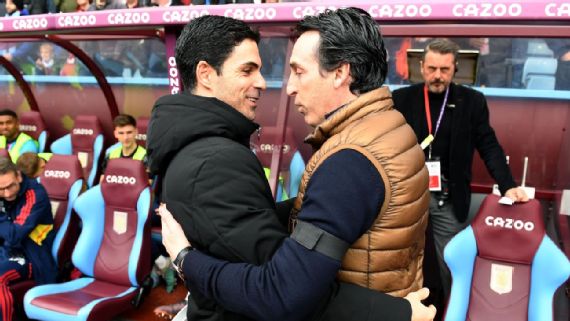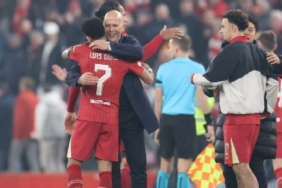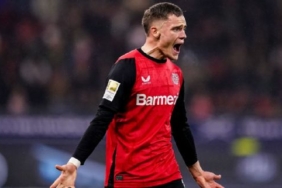One afternoon not so long ago while he was out with his family, the president of the Gipuzkoa Football Federation stumbled across Imanol Alguacil. It was a chance meeting but Manu Diaz had been wanting to speak to the Real Sociedad coach for a while.
Every year the federation presents an award to a legend from the smallest province in Spain, tucked in by the western corner of the border with France, and Diaz said something about Alguacil being the ideal person; one day in the not too distant future his achievements should be recognised, everything he is and everything he represents.
Nah, Alguacil replied. I’m no legend and, anyway, there are plenty of other candidates.
– Stream on ESPN+: LaLiga, Bundesliga, more (U.S.)
The response said a lot about his character, the humility which has made him even more popular, a deep fondness for him, and indeed the place he is from. But he was only half right. A Real Sociedad academy product and a fan whose son was brought up with the same passion, Alguacil was a full-back who spent almost a decade playing in the first team, making his debut in 1990, and later unexpectedly became manager. Maybe even the best they have had, although he would never say so.
Alguacil began coaching at his local club in the tiny fishing town of Orio, nine miles from Real Sociedad’s ground, then trained kids at nearby Karautz KE, and eventually returned to La Real as assistant coach for the U19s in 2011. He then worked with the B team, Sanse. Briefly made first-team coach because, well, someone had to, and he took over for nine games at the end of 2017-2018 but insisted that his commitment was to the kids, so he stepped down again. Then, half a year later they asked again and this time he stayed. He cared for his club too much not to continue when they needed him.
Five years on, Alguacil is still there. He took over a team struggling in 15th place. He led them to the 2020 Copa del Rey final and won it against their great Basque rivals Athletic Club. It was Real Sociedad’s first title in 34 years, and if anyone knew what it meant to them, it was him: after the game, he pulled on the team’s shirt, stretched as wide as he could, and started singing.
Real Sociedad are the only first division club in the province and only John Toshack and Alberto Ormaetxea had ever lifted a trophy for them before Alguacil. He also led them back to Europe, never leaving it since, finishing sixth, fifth, sixth and fourth. He took them back to the Champions League for the first time in a decade, playing some of the best football anyone can remember. Anoeta stadium had never been so much fun. This season, they won their Champions League group and not just without losing, but without even being behind for a single minute.
And all that with a team packed full of youth team products like him.
“Five years ago a lot of these lads were with me in Segunda B,” Alguacil said after the cup final. Of the 15 players who played in that final, 10 were from the Basque Country [including Robert Navarre], six from Gipuzkoa, and eight were youth-team products. Of the current first-team squad, 10 are from Gipuzkoa and 13 have come through the academy. In his time as coach, 22 academy players have been given debuts in the first team.
Oh, Alguacil is a Gipuzkoan legend alright.
Xabi Alonso’s side moved three points clear at the top. Unai Emery’s side beat the leaders. Who were Mikel Arteta’s side. Andoni Iraola’s side went to Old Trafford and put 3 past Man U. What could possibly connect them all? Spain’s smallest province; Europe’s best coaches.
Orio is a pretty little fishing town of just 6,000 people, where the biggest sport, almost a religion there, is rowin; boats forever heading out into the bay. They have won more of the prestigious Concha regattas than anyone else. The town of San Nicolas de Bari, patron saint of fishermen, is weather beaten, resilient, the kind of place that says: tough, direct, honest. A place that fits Alguacil’s profile so perfectly.
One of the reasons you know Alguacil is from there is that while he never talks about himself he keeps mentioning his town, keeps mentioning rowing, too: Orio, Gipuzkoa, is his identity. His is as proud of his place, his province, as they are of him. “He is a symbol,” says the local mayor, Anuska Esnal.
This place made Alguacil. It made others, too. Orio is just 10 miles from San Sebastian, the provincial capital. Nearby Usurbil is seven miles away and has a population of 6,145. It is the home town of Andoni Iraola. Go a little further and there’s Hondarribia, where Unai Emery is from. Xabi Alonso is from Tolosa. The coaches of Real Sociedad, Bournemouth, Aston Villa and Bayer Leverkusen, respectively: all of them from Gipuzkoan towns within 18 miles of San Sebastian, which is itself the home city of Arsenal manager Mikel Arteta.
At 765 square miles, Gipuzkoa is the smallest province in Spain. San Sebastian — Donostia, in Basque — has 185,000 people, meaning 40 Spanish cities are bigger. With 760,000 people across the entire province, it accounts for just 1.5% of the population of Spain. Yet when it comes to managers it makes up 50% of the Premier League’s top four and 100% of German’s top one.
Alguacil played in the same Real Sociedad youth team as Emery. Look at a team picture from then and you will also spot Javi Gracia, who was coach at Leeds. Roberto Olabe, now Real Sociedad’s sporting director, is in there too. And Imanol Idiakez, coach of Deportivo de La Coruna. Back in the late 1990s, Arteta played for a local youth club called Antiguoko in San Sebastian; among his teammates were Alonso and Iraola. Another Antiguoko player, Benat San Jose, is coaching in Bolivia’s top flight.
And there is more. Julen Lopetegui, the former Spain, Sevilla, Real Madrid and Wolves coach, a candidate to take over at Manchester United, is from Asteasu, 14 miles from San Sebastian. Manchester City’s assistant Juanma Lillo is, like Alonso, from Tolosa. Alonso’s father Periko, who won two leagues with Real Sociedad as a player, also coached. Asier Garitano, from Bergara, 40 miles from San Sebastian, is coaching Tenerife. And Joseba Exteberria, from Elgoibar, and a former player at La Real and Athletic, is at Eibar.
Reunited in the Premier League 30 years on 🫂
Mikel Arteta and Andoni Iraola played alongside each other for youth side Antiguoko in their younger years!#BOUARS pic.twitter.com/ZXT0Dwv9ef
Jagoba Arrasate, Copa del Rey finalist last year with Osasuna, is from Berriatua just across the border and into the Basque province of Vizcaya, but qualified as a coach in Guipuzcoa. Jose Luis Mendilibar, the current Europa League champion, is from Zaldivar, 15 miles south of there. Both from Vizcaya, they were still born in towns with 35 miles of San Sebastian. Ernesto Valverde, coach of Athletic Club, was brought up in Vitoria, Alava province, 60 miles away.
All of them are from the Basque Country, of which Guipuzcoa is officially one of three provinces. Gaizka Garitano and Eder Sarabia, Basques if not Guipuzcoans, are at Almeria and Andorra.
In total, the Basque Country accounts for 1.4% of Spain’s territory and 4.6% of its population. Even if you include Navarre in the Basque Country — and many do historically, culturally, socially, linguistically, politically, and in sporting terms — this is still just 3.6% of Spain’s territory, 6.2% of its population. For its coaching contribution to be this big is extraordinary; Gipuzkoa’s is barely believable. At the start of the season, a place smaller than Dorset provided 20% of all Premier League managers, for goodness sake.
“How does it happen? We ask ourselves that very question,” Manu Diaz admits.
There isn’t a single answer, and their paths are different, not all determined by the province from which they came. When it comes to influences, Lopetegui was part of a Barcelona squad under Johan Cruyff that would end up counting its coaches in double figures. Alonso worked under Rafa Benitez, Pep Guardiola, Jose Mourinho and Carlo Ancelotti, which is some apprenticeship. And Arteta went to La Masia at 15 and built a coaching career with Guardiola.
Emery began at tiny Lorca, way down in the southeast, a long way from home, when a knee injury ended a modest playing career. Iraola built his playing career at Athletic in Vizcaya, and worked with Marcelo Bielsa — although when he began to coach he came back to Antiguoko.
There are, though, some things that are shared, some qualities that define them and may help explain their success. “We’re a club focused on education, enjoyment and competitiveness. There is a passion for football. We have this slogan: Si estoy loco, soy del Antiguoko (If I’m mad, I’m at Antiguoko),” says Roberto Montiel, the Antiguoko president, and there’s something in that culture that can be felt across the Basque Country in general and Gipuzkoa in particular.
The Basque country’s two biggest clubs, Athletic and Real Sociedad face each other in the derby on Saturday. In all probability, over 70% of the players who start the game will have played for one of the two sides at pre-first team level and three quarters of them will be Basque. Both managers, Valverde and Alguacil, are Basque and former players of the clubs they now coach.
That reflects something deeper, a place of deep tradition, a powerful self-identity, a desire to develop, always improving and competing against the odds. The two clubs pride themselves on youth development, on teaching, which means coaching, a practical and almost spiritual dimension to the phenomenon.
When Arrasate is asked to explain it, he immediately mentions the name of Mikel Etxarri — the man who ran football in Gipuzkoa for decades, including preparing the next generation of coaches, and from whom the Osasuna coach says almost all of them have learnt. His own path saw him become a teacher: in fact, officially, he is still one on leave.
.jpg)
The beautiful game lives here. Stream top leagues, tournaments and teams.
Sign up for ESPN+
SATURDAY, JAN. 13 (all times ET)
• Coventry City vs. Leicester (7 a.m.)
• RB Leipzig vs. Eintracht (9 a.m.)
• Darmstadt vs. BVB Dortmund (9 a.m.)
• Bilbao vs. Real Sociedad (12 p.m.)
• PSV Eindhoven vs. Excelsior (3 p.m.)
• Real Betis vs. Granada (3 p.m.)
SUNDAY, JAN. 14 (all times ET)
• Queens Park Rangers vs. Watford (7 a.m.)
• Almería vs. Girona (8 a.m.)
• Borussia M’bach vs. Stuttgart (11 a.m.)
• Barcelona vs. Real Madrid (1:30 p.m.)
That focus on youth football, on teaching, Diaz notes, brings with it opportunities for coaches: the more you coach, the more you need coaches. And those who teach coaches. “The role of coaches is valued highly and the structures in place in Basque football prepare players to stay in the game. Clubs here turn to homegrown coaches,” Diaz says. In the last two years, 700 new coaches have gained their licence in Guipuzcoa.
Yet Lezama and Zubieta are not just academies, they are depositaries of an identity, rooted in their place and a reflection of it. Perhaps there is something in the culture, in the personality, that is conducive to the creation of coaches, and this is a place of high sporting participation, too.
Per inhabitant, no province has more registered footballers of all ages, boys and girls, than Gipuzkoa and nor is it just football: cycling, pelota (racket sport) and rowing are huge, the province has top flight teams in handball, basketball and athletics, and hosts the second biggest popular run in Spain. Then there are traditional Basque sports, about culture as well as competition, almost like Scotland’s highland games.
Lopetegui’s father José Antonio was a harrijasotzailea, a champion stone-lifter who held the record for raising 22 100-kilo cylinders in a minute. His uncle had been a harrijasotzailea and his brother Joxean was a pelotari. Lopetegui had a chance to be professional but liked football more. “My father didn’t do football at all yet growing up with the values he instilled — effort, sacrifice, never seeking excuses — helped forge my character,” he says.
“There is a culture of doing things collectively here,” says Jon Ayerbe, who played with Arteta, Alonso and Iraola at Antiguoko and now lives in Germany. “There’s a strong sense of doing things as a group. No one tries to stand out over the rest. That idea is deep in society here and you see it clearly in Xabi and Andoni: reflective, intelligent, no presumptuousness.”
Etxerri talks about a history of working the land, of industry, physical endeavours, building a culture of sacrifice and solidarity, seriousness. And the way Olabe puts it, this could be “an entire conversation about sociology,” all linked to the way Basque and Gipuzkoan society is, “forging us, building patience and perseverance.” He talks of the idea of the cuadrilla, a tight group of lifelong friends, always loyal, never about the individual, which is central to their sense of self.
An example: the gastronomic societies where people buy the ingredients together, cook together and eat together, sharing equally in the work and its rewards. “There may be something in that,” says Alvaro Parra, another former teammate of Iraola, Arteta and Alonso at Antiguoko. “They all have their own character but I think that’s about Basque society. I would say that the character here is competitive, serious, professional, everything as a collective function.”
In other words: when they’re not coaching teams, they are building them, even if on some subconscious level.
There is a video, entitled “Made in Gipuzkoa.” It is an advert sure, for a local health insurance company, but the idea it expresses is one that most agree with, proudly if quietly. The video tells the story of the provinces’ successes, including the fact that the first boat to circumnavigate the globe was captained by a Gipuzkoan, that they were pioneers in social services, that surfing came to the peninsula there first. And, yes, that a place this small has a “champion football team with loads of players from home.”
Many of those are things, the video concludes, that few people know. “And do you know why?” it asks. “Because we never say so.”
A bit like Imanol Alguacil.











